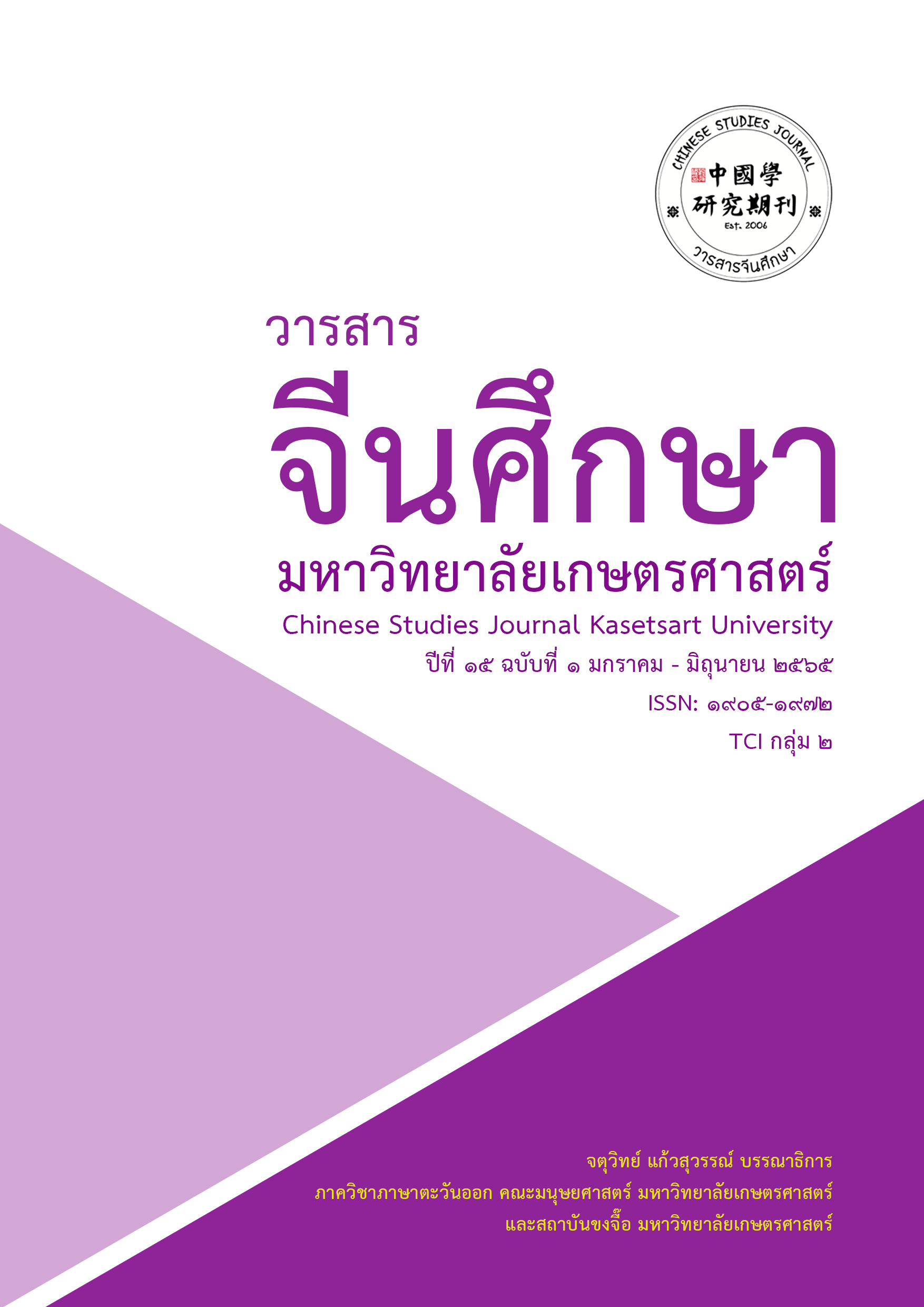An Analysis of Strategies Used in Translating Chinese Period Drama (古装) Titles into Thai กลวิธีการแปลชื่อละครโทรทัศน์จีนแนวย้อนยุค (古装) เป็นภาษาไทย
Main Article Content
Abstract
This article aims to analyze the language structures used in the translation of Chinese period drama titles, covering dramas broadcasted in Thailand between 1990 - 2019, to compare the meaning of Chinese period drama’s original titles with the broadcasted ones as well as to study the evolution in strategies of translating them in different periods of time. The researcher uses the qualitative research strategy in gathering information, then processes and analyzes the result by applying Skopos Theory and Christiane Nord’s concept of title translation. In analyzing 379 Chinese dramas’ titles, the researcher has found that various strategies were used to translate titles of dramas from Chinese into Thai. The most common strategy is partial literal translation with addition of Thai words. The second and third most common strategies are renaming titles with no relation to original ones, and renaming titles based on original meaning respectively. However, the preference of translating strategies change with the time. The most popular strategy used in 1990-1999 is partial literal translation with additional of Thai words (41.94%) but later in 2000 -2009 the most frequently used translating strategy is renaming
titles with no relation to original ones (32.18%) and in 2010-2019 partial literal translation with additional Thai words became the most frequently used method again (36.02%). Due to these several techniques of translation, the meaning of original titles and broadcasted ones could be unchanged, somewhat similar or even different. The research shows that the mostly used technique is the one of preserving similar meaning (59.10%).
Article Details

This work is licensed under a Creative Commons Attribution-NonCommercial-NoDerivatives 4.0 International License.
ผลงานทางวิชาการที่ลงตีพิมพ์ในวารสารจีนศึกษา มหาวิทยาลัยเกษตรศาสตร์ เป็นลิขสิทธิ์ของผู้เขียนหรือผู้แปลผลงานนั้น หากนำลงในวารสารจีนศึกษาเป็นครั้งแรก เจ้าของผลงานสามารถนำไปตีพิมพ์ซ้ำในวารสารหรือหนังสืออื่นได้โดยมิต้องแจ้งให้ทราบล่วงหน้า แต่หากผลงานที่ได้รับพิจารณานำลงในวารสารจีนศึกษา เป็นผลงานที่เคยตีพิมพ์ที่อื่นมาก่อนเจ้าของผลงานต้องจัดการเรื่องปัญหาลิขสิทธิ์กับแหล่งพิมพ์แรกเอง หากเกิดปัญหาทางกฎหมาย ถือว่าไม่อยู่ในความรับผิดชอบของวารสารจีนศึกษา มหาวิทยาลัยเกษตรศาสตร์ ทั้งนี้ ความคิดเห็นต่างๆ ในบทความเป็นความคิดเห็นส่วนตัวของผู้เขียน ไม่เกี่ยวกับกองบรรณาธิการวารสารจีนศึกษา มหาวิทยาลัยเกษตรศาสตร์
References
ถนอมนวล โอเจริญ. (2557). รายงานผลการวิจัยกลวิธีและปัญหาในการแปลชื่อเรื่องของ งานวรรณกรรมเยอรมันเป็นไทย. ทุนวิจัยกองทุนรัชดาภิเษกสมโภช, จุฬาลงกรณ์ มหาวิทยาลัย.
ประชาชาติธุรกิจ. (2562). “เทนเซ็นต์” ส่ง “WeTV” รุกตลาดสตรีมมิ่ง ชุดเด่น เอ็กซ์คลูซีฟคอนเทนต์จีน. เข้าถึงเมื่อ 15 กุมภาพันธ์ 2563, จาก
https://www.prachachat.net/ict/news-308777
ปริศนา ฟองศรัณย์. (2550). การใช้ภาษาไทยในการตั้งชื่อภาพยนตร์จีน. วิทยานิพนธ์
ปริญญามหาบัณฑิต. ภาควิชาภาษาไทย บัณฑิตวิทยาลัย มหาวิทยาลัยเกษตรศาสตร์.
ราชบัณฑิตยสถาน. (2550). หลักเกณฑ์การทับศัพท์ภาษาจีนและภาษาฮินดี. กรุงเทพฯ: ราชบัณฑิตยสถาน.
วรรณา แสงอร่ามเรือง. (2563). ทฤษฎีและหลักการแปล. กรุงเทพฯ: สำนักพิมพ์จุฬาลงกรณ์มหาวิทยาลัย.
ศูนย์จีนศึกษา. (2546). คู่มือการใช้ศัพท์ภาษาจีน. พิมพ์ครั้งที่ 2. กรุงเทพฯ: ศูนย์จีนศึกษา สถาบันเอเชียศึกษา จุฬาลงกรณ์มหาวิทยาลัย.
ศุภวรรณ ทองวัน. (2555). กลวิธีการแปลชื่อภาพยนตร์ตลกอเมริกันเป็นภาษาไทย. วิทยานิพนธ์ ปริญญามหาบัณฑิต. ภาควิชาภาษาตะวันตก บัณฑิตวิทยาลัย มหาวิทยาลัยศิลปากร.
สิทธา พินิจภูวดล. (2542). คู่มือนักแปลอาชีพ. กรุงเทพฯ: นานมีบุ๊คส์.
สมเกียรติ เชวงกิจวณิช. (2561). แนวคิดและเทคนิคการแปลภาษาญี่ปุ่น-ไทย. กรุงเทพฯ: สำนักพิมพ์มหาวิทยาลัยธรรมศาสตร์.
Ch3thailand. (2020). ผังรายการ. เข้าถึงเมื่อ 15 กุมภาพันธ์ 2563, จาก https://www.ch3thailand.com/ซีรีส์ช่อง 3
Marketing Oops. (2020). อ่านกลยุทธ์ “LINE TV – LINE TODAY” จิ๊กซอว์ดึงคนใช้ เวลาอยู่กับ “LINE Ecosystem” นานขึ้น!. เข้าถึงเมื่อ 5 ตุลาคม 2563, จาก https://www.marketingoops.com/media-ads/line-tv-line-today-growth-strategies-line-nexplosion-2020/
MCOTHD. (2020). ผังรายการ. เข้าถึงเมื่อ 14 กุมภาพันธ์ 2563, จาก https://tv.mcot.net/tvlisting
Money Buffalo. (2018). ที่มาของ “Netflix” กว่าจะมาเป็นผู้ให้บริการคอนเทนท์ระดับ โลก. เข้าถึงเมื่อ 15 กุมภาพันธ์ 2563, จาก https://www.moneybuffalo.in.th/business/ที่มาของ-netflix-คอนเทนท์
MONOMAX. (2020). ซีรีส์จีน. เข้าถึงเมื่อ 15 กุมภาพันธ์ 2563, จาก https://www.monomax.me/tag/series_ซีรีส์จีน
MovieclubHd.TV. (2020). ดูซีรีส์จีน (Chinese Series). เข้าถึงเมื่อ 14 กุมภาพันธ์ 2563, จาก https://www.movieclubhd.tv/th/series-category/china
MVhub. (2020). อาณาจักรคนรักหนังจีน. เข้าถึงเมื่อ 15 กุมภาพันธ์ 2563, จาก https://www.mvhub.com
Thai PBS. (2020). รายการเก่า. เข้าถึงเมื่อ 15 กุมภาพันธ์ 2563, จาก https://program.thaipbs.or.th/programs/archived
Cambridge University Press. (2021). Cambridge Dictionaries online. Retrieved December 6, 2021, from https://dictionary.cambridge.org/dictionary/english/
Mei, Z. (2010). On the Translation Strategies of English Film Title from the Perspective of Skopos Theory. Journal of Language Teaching and Research, 1(1), 66-68.
Nida A. E. and Taber R. C. (1982). The theory and Practice of Translation. 8 vols. Leiden: Netherland.
黄燕. (2016). 语言学视域下的古装剧剧名研究. 太原城市职业技术学院 学报 184(11月): 204-205.
梁悦悦. (2013.) 中国电视剧在泰国: 现状与探讨. 环球新视野 278: 76-77
李法宝. (2016).论中国电视剧在泰国的传播. 现代视听探索思考 : 33-37.
王奕雯, 李淼, 李悦. (2017). 中国古装电视剧在泰国影视市场发展研究. 经营有道: 76-78.
鄢彬. (2014).新世纪我国大陆影视剧剧名的语言学研究. 硕士学位论文. 语言学及应用语言学 文学学院 浙江师范大学.
张智华. (2012). 电视剧类型. 北京: 北京师范大学出版社.


